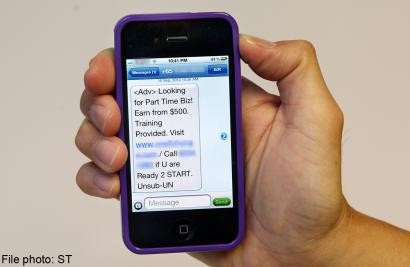Do-Not-Call kicks in with 400,000 numbers

SINGAPORE - Singapore's Do-Not-Call (DNC) Registry went into force on Thursday with 400,000 numbers listed, and two complaints already about unsolicited text messages.
The consumers who complained said they had registered their numbers on the DNC Registry last month, but received marketing text messages on Thursday.
The Personal Data Protection Commission (PDPC), which manages the registry, said it is investigating the complaints, but declined to provide details.
Of the numbers listed on the registry, three-quarters had opted to block all marketing channels - calls, SMS and fax - the PDPC noted at a press conference on Thursday.
Early indications are that companies are also taking the new rules now in force seriously.
As quickly as five minutes after the rules kicked in at midnight yesterday, several companies had checked the DNC Registry, which contains the phone numbers of consumers declining to receive marketing by phone calls, SMS or fax, said the PDPC.
Some 560 organisations have registered to check against the listings, with 95 organisations having looked up some 13 million numbers for a fee on Thursday.
"Operationally, things are running as expected. The fact that companies were coming in five minutes after the start of the DNC Registry means that companies are serious about (it), and taking steps to comply," said a PDPC spokesman.
The Singapore Chinese Chamber of Commerce and Industry and the Singapore Business Federation said they had yet to hear from members on how they are coping with the registry's launch.
However, The Straits Times understands that some organisations have suspended their telemarketing activities as they scramble to comply with the new law.
For instance, property firm PropNex has suspended its call centre for a month, its chief executive officer Mohamed Ismail told The Straits Times. Calls are now made by the firm's 3,000-plus agents using a new smartphone app that automatically identifies a number listed on the DNC.
This arrangement is being tested for a month. "We may shut down the call centre if our agents are comfortable with the app," said Mr Ismail.
Before yesterday, its 50 to 60 telemarketers used to make cold calls from a list of numbers every evening. Firms cannot dial numbers listed on the DNC Registry unless they have received prior consent from consumers.
PropNex claims that between 40 per cent and 50 per cent of its clients have opted to receive marketing offers.
Meanwhile, other organisations are also seeking customers' consent to send them promotional messages.
Mr Michael Tan, key executive officer of property firm OrangeTee, said its agents have, since last month, been sending e-mails to ask contacts to opt in to receive publicity materials. Of the 40,000 showflat visitors contacted, more than 60 per cent have consented to receiving marketing calls and text messages, Mr Tan said.
A concession announced last Thursday - amid protests from consumers and privacy advocates - allows firms to send SMS and fax messages to existing customers without having to check the DNC Registry.
The PDPC had defended its move repeatedly, saying the exemption order was not a U-turn, but rather an expansion of options for consumers.
It also said the move did not dilute the original intention of the registry, and was not a back-pedalling on the registry's part.
The PDPC also warned businesses not to use the exemption order as a "back door" to indiscriminate marketing.
The concession applies to clients with whom firms have an "ongoing relationship". For instance, a bank will be able to send credit card users an SMS about a rewards programme.
But someone who visits a property launch is not considered an "ongoing" customer.
Property agents will not be allowed to send him messages about new launches without checking with the registry or getting explicit consent.
Ms Angie Tay, vice-chairman of the Contact Centre Association of Singapore which represents call centres here, said: "If in doubt, it is best to seek customers' consent anyway. It is an industry best practice that we have always been advocating."

Get a copy of The Straits Times or go to straitstimes.com for more stories.